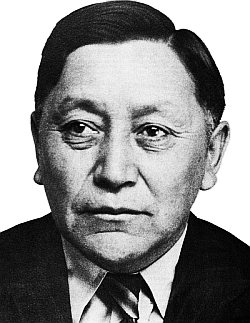Robert Yellowtail facts for kids
Quick facts for kids
Robert Summers Yellowtail
|
|
|---|---|
 |
|
| Crow Nation leader | |
| Personal details | |
| Born | August 4, 1889 Lodge Grass, Territory of Montana |
| Died | June 20, 1988 (aged 98) |
| Known for | Leadership of the Crow Nation |
Robert Summers "Robbie" Yellowtail (born August 4, 1889 – died June 20, 1988) was a very important leader of the Crow Nation. He was called a "20th Century Warrior" because he fought for his people's rights. Yellowtail was the first Native American to be the Superintendent of a reservation, which meant he was in charge of managing his own tribe's land and affairs.
Contents
Robert Yellowtail's Early Life and School
Robert Yellowtail was born in Lodge Grass, Montana in 1889. He had three different Crow names during his life. First, he was called Bíawakshish, meaning "Summer." Later, he was known as Shoopáaheesh, or "Four War Deeds." Finally, he was named Axíchish, which means "The Wet." This last name was also used by another brave war chief from his family group.
When he was only 4 years old, Robert was sent to a reservation boarding school. This was a common practice then, where Native American children were taught new ways of life. At 13, he went to the Sherman Institute in Riverside, California, and he finished school there in 1907. He then studied law in Los Angeles and later at the University of Chicago Law School. He earned a law degree, which helped him understand and use laws to protect his people.
Robert Yellowtail's Family Life
Robert Yellowtail was married four times during his long life. In 1911, he married a daughter of a man named Spotted Horse. After she passed away in the 1920s, he married Lillian Bull Shows. His second marriage ended, and in 1932, he married Margaret Picket. Later, in 1960, he married Dorothy Payne. Robert Yellowtail had seven children and many grandchildren.
Robert Yellowtail: A Political Leader
Robert Yellowtail became a strong voice for the Crow Nation.
Fighting for Crow Land Rights
In 1910, a famous Crow chief named Plenty Coups asked Yellowtail for help. A senator from Montana wanted to pass a law that would open the Crow Indian Reservation to new settlers. This would have taken land away from the Crow people. Yellowtail worked for seven years in Washington, D.C., and finally, the bill was stopped.
In 1912, Yellowtail got his first official job as a representative on a tribal committee. He helped manage land deals and made sure the Crow people had a say in land disagreements. He quickly became known for his skills. Less than a year later, he traveled to Washington, D.C., for the first time. He also worked as an interpreter for important Crow leaders like Medicine Crow and Plenty Coups at a national event in New York City.
Protecting Crow Lands and Rights
In 1920, Yellowtail helped create the "Crow Allotment Act." This important law helped protect Crow lands. He also played a big part in getting voting rights for all Native Americans in 1924. This was a huge step forward for Native American citizens.
From 1934 to 1945, Yellowtail served as the Superintendent of the Crow Indian Reservation. This was a special time because he was the first Native American to lead his own tribe in this role. During his time as Superintendent, he achieved many things:
- He convinced white ranchers to return 40,000 acres of land to the Crow tribe.
- He helped build a hospital for the Crow people.
- He brought horses and cattle from Canada to help the tribe.
- He even brought buffalo from Yellowstone National Park back to the reservation.
The Fight Against Yellowtail Dam
Yellowtail also strongly opposed building a dam on the Bighorn River. This river flows through the southern part of the Crow reservation. The dam would have flooded the Bighorn Canyon, which is a very sacred place for the Crow people. Even though he fought hard, the dam's construction began in 1961. However, Yellowtail did win a small increase in the money paid to the tribe for their land. In a strange twist, the dam was actually named Yellowtail Dam after him.
Even in the 1980s, Yellowtail continued to fight for his people. He argued for fair payments for coal from the reservation's mineral rights. These rights were managed by the Bureau of Indian Affairs, a government agency.
In 1985, a video called Contrary Warriors: A Story of the Crow Tribe was made about Robert Yellowtail and his work.
 | Claudette Colvin |
 | Myrlie Evers-Williams |
 | Alberta Odell Jones |

